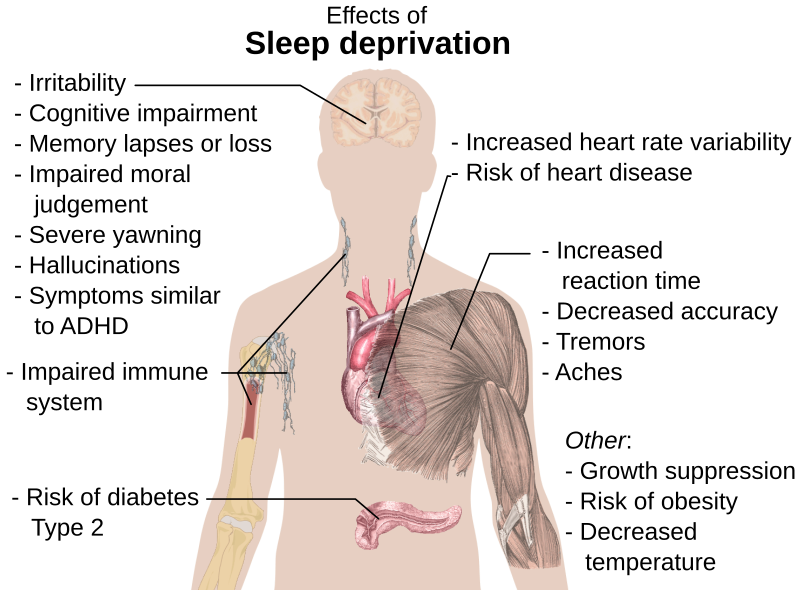Why Some People Are Closer To Their Parents?
Sleep deprivation is pretty common these days—it's a major attribute of accomplishment-oriented societies—but why would anyone have a honey-hate relationship with information technology? Usually, one would say,sleep deprivation and all the accompanying symptomsare the definition of a beloved-hate relationship, to the cadre.
Let me tell you something: you canutilise sleep deprivation for your own do good. We'll get into how this works, but first, let's hash out the miracle of slumber, slumber impecuniousness and its symptoms, and finally design a "how to" experiment nearly sleep deprivation(commonly known equally cocky-torture), and ask ourselves, more importantly, why?
Sleep: Functionality
"Slumber is a naturally recurring state characterized by reduced or absent consciousness, […] and inactivity of most all voluntary muscles." (Macmillan, 1981). This is a short and clear explanation:
- sleep is characterized by slumber stages/cycles (5 cycles, differing in depth)
- the deeper your sleep, the improve the quality of sleep
- More Sleep ≠ Better (healthy avg. vii.5-ix hours)
The functions of sleep are very multifaceted and majorly unexplored, but these (validated, and commonly accustomed) aspects interest u.s.a. the most right now. Sleep has a major impact:
- on our memory and the ability to re-organize thoughts, experiences and to learn new things (neuroplasticity)
- on the regulation of necessary hormones and the ability of our trunk to regenerate physically
What is Sleep Deprivation?
Sleep deprivation is the lack of sleep: either it was caused by a very superficial and short slumber (over a flow of some days) or by no sleep at all. The functionality and benefits of slumber are express every bit a result (see higher up), and we might confront someserious bug, if we stay sleep-deprived for a prolonged period of time.
The effects of sleep deprivation are various; some occur instantly afteracute deprivation, other occur only afterchronic deprivation:

(past Mikael Häggström, Wikimedia Commons, 2009)
Later on acute deprivation:
- irritability
- cognitive impairment
- retentiveness lapses
- restricted judgement
- severe yawning
- increased heart-rate variability, increased reaction time and decreased accuracy
- temporary emotional instability
After chronic deprivation:
The furnishings of chronic deprivation boil down to the development of diverse diseases, such as:
- Diabetes
- heart disease
- growth suppression
- restricted allowed organisation functionality
- weight gain/loss
- depression
Due to the diverseness of astute deficits, sleep impecuniousness has been used as a successful interrogation technique. In fact, the U.S. military authorised sleep deprivation as an interrogation method (Get out no Marks: Enhanced Interrogation Techniques and the Risk of Criminality, August 2007).
But hey, why would in that location exist alove-hate relationship here? What's the benefit for us?!
How To (..and the benefits of sleep impecuniousness?!)
The furnishings of sleep deprivation on the human body were observed and analyzed in the 70s: the methodological monitoring involved claret analysis, but likewise neuropsychological instruments to capture the brain activity during sleep-deprivation and duringrecovery sleep later on deprivation.
The results:"There's evidence of antidepressive outcome after sleep deprivation."As a matter of fact, subjects experienced a37.2 % improvement in their mood!
The background of these results are diverse—the reasons behind the remarkable mood improvement are, amidst others:
- biochemical investigations proved an increase of different hormones, including serotonin and noradrenaline, which are also known to functionas a happiness hormone (serotonin) and stimulating hormone (noradrenaline)
- improved slumber continuity and depth in the night after slumber deprivation
These mentioned effects take activeness in depressedbut also non-depressed people,meaning that y'all can stay awake for a nighttime, begin the side by side day as yous ordinarily practise and try to go along yourself awake (that'southward not very easy!) and go to bed quite early → sleep like a baby → wake up the next morning withmore power and energy.
By depriving yourself of slumber, youset up your biological clock to zero— in example your fourth dimension direction is messed up and running out of fuel, this can very helpful (a love-hate relationship). Y'all can phone call sleep deprivationsleephacking: at first nosotros abstain from sleep, and after (during the recovery dark) we skid into a very deep state of sleep, which will regenerate us.
Admittedly, slumber deprivation amidst healthy people is ofttimes met with skepticism, mainly considering healthy subjects can regulate their slumber pattern in other ways (through nutrition, sleep hygiene and sleep rituals). On the other hand, sleep impecuniousness is gratis of any serious side effects and tin can serve as a quick ready. Hither's a brusk how-to:
- Perform your slumber deprivation "experiment" on the weekend (working in a sleep deprived state can be difficult)
- Keep yourself awake during your sleep impecuniousness dark (and the post-obit twenty-four hours) with the aid of tea or coffee, but please don't overdo information technology
- Go to bed early on your sleep-deprived mean solar day, and savor your deep recovery night (vii.5 – 9 hours)
- Wake upward powerful and energized, feeling similar a million dollars
After your sleep deprivation experiment yous should take care of a well-balanced diet and good sleeping habits—practice not regress to erstwhile, negative tendencies. Slumber deprivation for a night can be applied easily, is highly effective and complimentary of serious side effects. Have yous already tried information technology? Share your experience with us!
Featured photo credit: Lux Graves via unsplash.com
Source: https://www.lifehack.org/417258/why-some-people-are-closer-to-their-parents
0 Response to "Why Some People Are Closer To Their Parents?"
Post a Comment